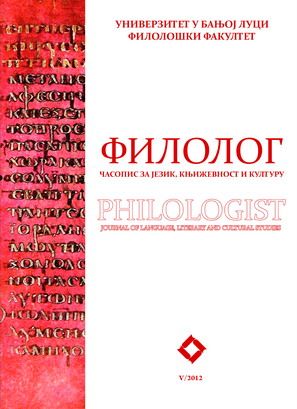Epiphany. “A Portrait of the Artist as a Young Man” in the Light of Homer’s and Ovid’s Poems
Epiphany. “A Portrait of the Artist as a Young Man” in the Light of Homer’s and Ovid’s Poems
Author(s): Jelena N. PilipovićSubject(s): Language and Literature Studies, Literary Texts, Comparative Study of Literature, Philology, Theory of Literature
Published by: Филолошки факултет Универзитета у Бањој Луци
Keywords: James Joyce; Homer; Publius Ovidius Naso; poetics; aesthetics; intertextuallity; transcendence; polysemy;
Summary/Abstract: Establishing inter-textual links between the so-called “epiphany” segment of A Portrait of the Artist as a Young Man and the epiphany patterns in the classical poetic opera: Homeric epics and Ovidian poems Ars amandi and Metamorphoses, this paper aims to develop a sequence of analogies which will bring to a better understanding of the meta-poetic meaning of Joyce’s famous text. The Joycean epiphany echoes the Homeric one, but omits the key-point: the revelation of an Olympic god or goddess, instead of whom a diff erent kind of divinity, the intrapsychical Daedalus, artifex, is revealed. This transformation of the actual divine beings into the divinity of art and artistic self-consciousness echoes Ovid’s version of the Daedalus-Icarus myth, taken by the Latin poet as a parabola of the artistic eff ort and creation. The Homeric proto-text enables a reader of Joyce to seize the metaphorically divine status of the artifex in the modern world, and to interpret Joyce’s works in the context of the relation between the immanent and the transcendent. Thanks to Ovid’s insights, the inner Daedalus and Icarus, transferred from A Portrait to Ulysses and to Finnegan’s Wake, can be seen as an iconic self-contemplation of Joyce-artifex. As author, Joyce creates simultaneously in the manner of a poeta vates, of an inspired creator in the de-divinized world, and of a poeta faber, of an innovator on the téchne plan. Due to such inner poetic ambiguity, he remains a slave to an endless wish that leads him not only to self-deconstruction, but also to self-annihilation – through divine sublimation, that deep negativity gives birth to the impenetrable wonder of Joycean creation. Poetics of Ulysses and of Finnegan’s Wake alike, reveal a creative self, which, being Daedalus, always remains Icarus as well. That insight, owed to Homer and Ovid, might help enlighten the idion of Joyce’s powerful originality.
Journal: Филолог – часопис за језик, књижевност и културу
- Issue Year: 2012
- Issue No: 5
- Page Range: 28-36
- Page Count: 9
- Language: English

